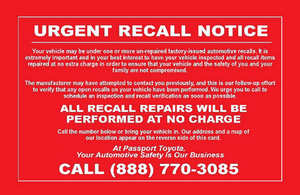















|
|---|
 Topics: Passport Toyota, Passport Nissan
Topics: Passport Toyota, Passport Nissan
|
| Agency: Federal Trade Commission
Date: 10 October 2018 |
According to the FTC, the vast majority of the vehicles covered by the notices did not have open recalls. The court orders settling the FTC’s charges bar all of the defendants from such deceptive conduct in the future.
“Many vehicles currently on the road are subject to open safety recalls. Legitimate recall notices sent by manufacturers and auto dealers are essential to getting those vehicles fixed quickly,” said Andrew Smith, Director of the FTC’s Bureau of Consumer Protection. “However, deceptive fake recall notices may not only trick consumers into visiting a dealership, but also may cause them to ignore legitimate recall notices in the future, risking their safety.”
The dealerships do business as Passport Toyota, Passport Nissan of Alexandria, Virginia, and Passport Nissan of Marlow Heights, Maryland. Everett A. Hellmuth, III is the founder and president of the dealerships and Jay A. Klein is their vice president. The marketing company, Temecula Equity Group, LLC, does business as Overflowworks.com, and Jeffrey R. Bush is its founder and CEO.
 According to the FTC’s complaint, in early 2015 the defendants mailed fake recall notice postcards to nearly 7,000 Toyota owners. The complaint alleges the defendants made no effort to limit the mailing list to consumers whose vehicles were subject to open recalls. The notices warned consumers about supposedly urgent recalls, with prominent language such as “URGENT RECALL NOTICE” in large, bold-faced, uppercase letters.
According to the FTC’s complaint, in early 2015 the defendants mailed fake recall notice postcards to nearly 7,000 Toyota owners. The complaint alleges the defendants made no effort to limit the mailing list to consumers whose vehicles were subject to open recalls. The notices warned consumers about supposedly urgent recalls, with prominent language such as “URGENT RECALL NOTICE” in large, bold-faced, uppercase letters.
According to the FTC, despite numerous complaints, the defendants sent virtually identical “urgent recall” notices to more than 14,000 Nissan owners in June 2017. The FTC alleges that, as with the Toyota notices, the defendants failed to take steps to ensure that the consumers who received the Nissan notices had vehicles with open recalls – and the vast majority did not.
What the FTC Did to Protect Consumers
The FTC filed a federal district court complaint against the defendants alleging that the Toyota and Nissan recall notices were deceptive in violation of Section 5 of the Federal Trade Commission Act. At the same time, the FTC filed proposed orders signed by all of the defendants settling the FTC Act allegations and prohibiting the defendants from deceiving consumers in the future.
The complaint alleges that the defendants sent the mailers to increase business at the dealerships’ service departments, not to alert consumers about actual recalls. According to the complaint, after receiving the fake recall notices, hundreds of vehicle owners contacted Passport’s call centers, many of whom were told they had to go to the defendants’ dealerships to learn whether their vehicle was actually subject to a recall.
What the Settlements Mean
Under the court orders with the FTC, the Passport car dealer defendants and the marketing company defendants are permanently prohibited from misrepresenting, expressly or by implication: 1) whether any motor vehicle is subject to an open safety recall or service campaign, or 2) certain other material facts about motor vehicles.
The Commission vote authorizing the staff to file the complaint and proposed stipulated final orders was 4-0, with Commissioner Christine Wilson not participating. The FTC filed the complaint and proposed final orders in the U.S. District Court for the District of Maryland, Southern Division.
NOTE: The Commission files a complaint when it has “reason to believe” that the law has been or is being violated and it appears to the Commission that a proceeding is in the public interest. Stipulated final orders have the force of law when approved and signed by the District Court judge.
The Federal Trade Commission works to promote competition, and protect and educate consumers. You can learn more about consumer topics and file a consumer complaint online or by calling 1-877-FTC-HELP (382-4357). Like the FTC on Facebook, follow us on Twitter, read our blogs, and subscribe to press releases for the latest FTC news and resources.
STAFF CONTACT:
Thomas Kane
Bureau of Consumer Protection
202-326-2304
